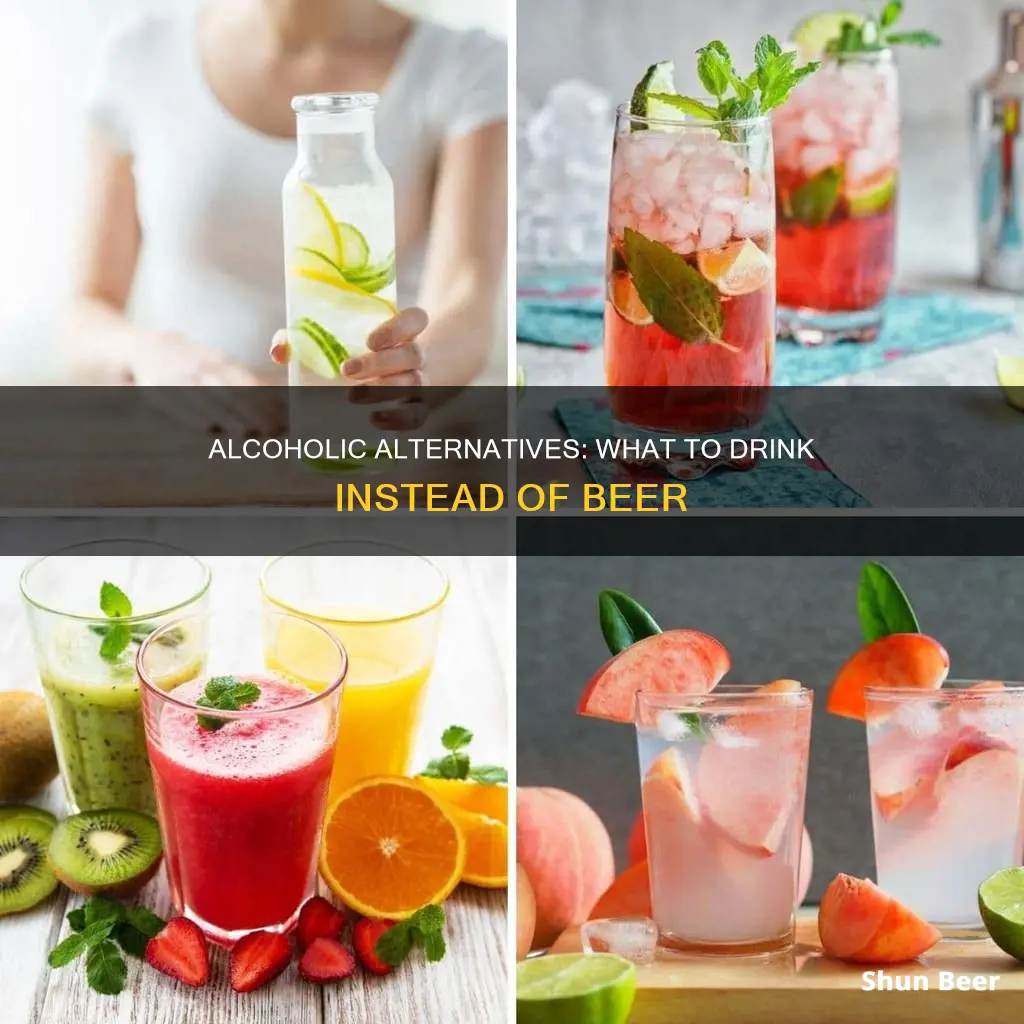
Alcohol is often associated with a range of health issues, including injuries, poisoning, and long-term liver, heart, and mental health problems. As a result, many people are seeking healthier alternatives to alcoholic drinks. Non-alcoholic beer is one option, but what about those who don't like beer? This article will explore various drinks that can be enjoyed instead of beer, providing flavourful and sophisticated alternatives without the adverse effects of alcohol. From kombucha and ginger beer to mocktails and alcohol-free spirits, there is a diverse range of options to suit different tastes and preferences.
What You'll Learn

Non-alcoholic beer, wine, or cider
Non-alcoholic beer, wine, and cider are excellent alternatives for those looking to cut down on their alcohol consumption or seeking alcohol-free options that fit their lifestyle. These beverages go through similar production processes as their alcoholic counterparts but with techniques to limit or remove alcohol content. Here are some insights into these alcohol-free options:
Non-Alcoholic Beer
Non-alcoholic beer is produced using the same ingredients as traditional beer, such as malted barley, hops, yeast, and water. Brewers employ specific techniques to remove or limit alcohol content, including early fermentation stoppage, using special yeast strains that produce less alcohol, and vacuum distillation. The result is a diverse range of non-alcoholic beers, from light lagers and crisp pilsners to hoppy IPAs and rich stouts, catering to different tastes.
Non-Alcoholic Wine
Non-alcoholic wines are crafted using traditional winemaking methods, where grapes are harvested, crushed, and fermented to create a base wine. Subsequently, techniques are applied to reduce or eliminate the alcohol content. These wines offer the same flavour profiles and complexities as traditional wines without the alcohol, making them a suitable choice for wine enthusiasts seeking alcohol alternatives. The market provides a diverse range of options, including reds, whites, rosés, and sparkling varieties.
Non-Alcoholic Cider
Non-alcoholic cider is crafted using similar methods as traditional hard cider. The process involves selecting and pressing apples to extract the juice, followed by pasteurization to eliminate bacteria and wild yeast. The fermentation process is either stopped early or not initiated, resulting in a beverage with minimal to no alcohol content. Additionally, alcohol removal after fermentation can be achieved through filtration or reverse osmosis. The non-alcoholic cider market offers a range of options, including crisp and dry varieties, sweeter and fruit-infused options, and alternatives made with pears.
These non-alcoholic options provide excellent alternatives for those seeking to reduce their alcohol intake or opting for alcohol-free beverages. They allow individuals to enjoy similar flavour profiles and sophistication while avoiding the adverse health effects associated with alcohol consumption.
The Ultimate Refreshing Beer Experience
You may want to see also

Mocktails or non-alcoholic cocktails
Mocktails, or non-alcoholic cocktails, are a great way to enjoy the experience of drinking without the alcohol. They are also a fantastic option for those who are looking for a healthier alternative to alcoholic drinks.
Mocktails can be made with a variety of ingredients, such as fresh fruits, herbs, spices, juices, and syrups. This allows for a wide range of unique and satisfying flavour combinations. For example, a combination of strawberry, lemon, and mint in sparkling water creates a light and sweet drink. Alternatively, cucumber, lemon, and celery make for a popular and refreshing option.
Many bars and restaurants now offer extensive mocktail menus, with alcohol-free alternatives to famous cocktails such as Mojitos, Lemon Drops, and Bloody Marys (often called Virgin Marys). Classics like the Shirley Temple are also a common feature on these menus.
However, it is worth noting that mocktails often contain a lot of sugar due to the use of fruit juice. As nutritionist Pauline Cox explains, "The fructose in a carton of fruit juice or soft drink is used by the body in exactly the same way as alcohol is. Sweet, fizzy drinks are high in glucose, sucrose, and fructose and disrupt our hunger signaling and blood sugars." Therefore, it is important to be mindful of the ingredients used in mocktails, especially if you are concerned about sugar intake or sugar cravings.
Mocktail variety packs are also available for purchase online, offering a range of popular drinks like Mockscow Mule, Mockarita, Mockapolitan, and Sansgria.
The Magic of Beer Bread: How Does It Work?
You may want to see also

Kombucha
However, it is important to note that the amount of alcohol in kombucha can vary depending on the brewing process. While store-bought kombucha is typically within the 0.5% ABV limit, home-brewed kombucha may have a higher alcohol content, potentially rising as high as 3%. Therefore, for recovering alcoholics, consuming kombucha may be a personal decision. Some may find that it helps them avoid relapse by providing a similar experience to alcoholic drinks without the same risks, while others may prefer to avoid it due to the small amount of alcohol it contains.
Ultimately, the decision to drink kombucha during recovery is a personal one, and individuals should consider their own comfort level and recovery goals when making this choice. It may be helpful to consult with a therapist or counselor to determine if kombucha is a safe choice for one's individual recovery journey.
Beer and Sore Throats: Is There a Link?
You may want to see also

Ginger beer or ale
Ginger beer and ginger ale are both non-alcoholic drinks with similar names and flavours, but there are some key differences between the two.
History
Ginger beer was originally an alcoholic drink from England, made by fermenting and brewing ginger, sugar, and water, and sometimes lemon. This process, which used a starter culture called the ginger beer plant, resulted in an 11% alcohol content. However, most commercial ginger beers today are non-alcoholic, containing less than 0.5% alcohol or no alcohol at all.
Ginger ale, on the other hand, is a non-alcoholic drink that originated in Ireland and became popular in Canada in the early 1900s. It is essentially a ginger-flavoured soft drink, often with a small amount of alcohol from the fermentation process.
Flavour and Appearance
Ginger beer has a stronger, spicier, and more robust flavour than ginger ale. It is also less carbonated, with a darker colour that can be clear or cloudy depending on the filtering process. Ginger beer's flavour makes it enjoyable on its own or as a mixer in cocktails like the Moscow Mule, Dark 'n' Stormy, or even a sangria.
Ginger ale, in comparison, has a lighter, more delicate flavour and higher carbonation. It is often used as a mixer in cocktails due to its mild taste. Ginger ale comes in a variety of flavours, including green tea, blackberry, cranberry, black cherry, pomegranate, and peach.
Health Benefits
Ginger beer and ginger ale are both low-calorie alternatives to beer, with potential health benefits. Research suggests that ginger root contains compounds such as shogaols and gingerols, which may help prevent inflammation and protect against cellular damage, supporting liver health and offering protection against certain toxins, including alcohol.
Where to Buy
You can find ginger beer and ginger ale at various retailers, including Whole Foods and Belvoir Farms. Some popular brands of ginger beer include Fever Tree, Bundaberg, and Fentiman's, while Bruce Cost, Red Rock, and Vernor's are well-known ginger ale options.
Czech Republic's Beer Drinking Culture: How Much is Too Much?
You may want to see also

Alcohol-free spirits
The market for alcohol-free spirits is growing, and several brands are now producing non-alcoholic versions of popular spirits such as gin, whiskey, tequila, rum, and aperitifs. These drinks are crafted using natural ingredients and distillation techniques to mimic the taste and sophistication of their alcoholic counterparts. For example, Free Spirits uses a process called Distillate Reconstruction to identify the raw materials, interactions, and alchemy that give a traditional spirit its unique flavour profile. They then source natural ingredients like American White Oak, European Juniper, and Mexican Blue Agave to distill their essential flavours and create non-alcoholic alternatives.
Ritual Zero Proof is another popular brand that offers a range of non-alcoholic spirits, including gin, rum, whiskey, tequila, and an aperitif. Their products have received excellent ratings, with customers raving about their ability to create light and tasty spritzes or sophisticated cocktails without the alcohol.
Non-alcoholic spirits provide an excellent option for those who want to reduce their alcohol intake, whether for health reasons or personal preferences. They allow individuals to still enjoy the social and flavourful aspects of drinking while prioritising their well-being.
In addition to non-alcoholic spirits, there are also other alcohol-free alternatives available, such as non-alcoholic beer, wine, cider, mocktails, kombucha, and ginger beer, ensuring that everyone can find an option that suits their tastes and preferences.
Beer Drinking and Heaven: What's the Verdict?
You may want to see also







